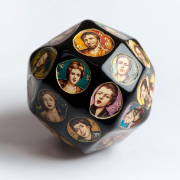Overview
About This Club
Type of Club
- What's new in this club
-
Unfortunate it is impossible to create polls in the middle of topics on EcchiDreams. If it was, might have made one to test interest in what I should read (preparing either as a GM or player) and maybe see how practical it would be start/help start. Not something that would happen anytime soon, but maybe a someday project. Though if I do find myself with a free slot again, may someday recreate the Star Wars club.
-
I know I am not planning to leave anywhere unless something goes terribly wrong. Sadly, from what I saw, a lot of stories, especially multiplayer ones, die pretty fast. I don't want to be a sour apple but I've been on Ecchidreams for years now. Long enough to see things rise and fall many times. I'll help however I can and we can hope for the best.
-

Cortex Game Interest Check
SataiRolePlayingGuy replied to IsabellaRose's topic in TTRPG Club's Discussion
I guess one more thing worth clarifying there on this thread. Guessing the groups are permanent then, barring any unexpected emergencies forcing people to drop out (hopefully everyone there is committed to sticking through it, unless something like that comes up)? Assuming it isn't trouble for you, two worlds could work in that case. Don't have a problem with it if that is the case. Just figure someone getting shuffled around is the most important reason we might want to keep it to one world. -

Cortex Steampunk Game 1 OOC Discussion
WritesNaughtyStories replied to IsabellaRose's topic in TTRPG Club's Discussion
Absolutely, I concur. Zeppelins. This precisely gets to the kind of technological tension and kind of struggle to forge a better future in the frontier that I most associate with westerns. Leaning so heavily on Izzy's Prudence Lawton as my character concept does, I'm voting this is whoever Prudence broke from. Are the Unbound analogous to the early Protestants and Unitarians? How violent is the schism? -

Cortex Steampunk Game 1 OOC Discussion
StarlitSiren replied to IsabellaRose's topic in TTRPG Club's Discussion
I like this group -

Cortex Steampunk Game 1 OOC Discussion
WickedCadrach replied to IsabellaRose's topic in TTRPG Club's Discussion
Hi, everyone! I'm alive. Sorry I wasn't around most of the week, but I'm back. Okie-dokie, first up, I want: Airships : aesthetically, I would prefer zeppelins and hot air balloons over anything more scifi or fantasy. Automatons : I think it could be neat to treat automatons the way trains are often treated in Westerns. They are emblematic of the blight of progress, pushing out simple folk and making their lives harder while the wealthy robber barons control their manufacture and use from distant cities. I'm thinking *The Octopus* but with clockwork track-layers, coal shovelers, and even steam-driven oxen pulling Union-Pacific branded plows while the simple farmer behind on his payments to the land baron can only watch in dread at the technology in the next field slowly tilling him under with every row. The tension with Automatons can also go into John Henry veins and even spur Luddite groups to acts of sabotage and explosive, dynamite-fueled arson to fight back. Gunfighters in dusty streets : particularly if their spurs jangle, their cigarettes are hand-rolled, and their calloused hands are surprisingly gentle (at first) The Invisible World : A la Lovecraft's From Beyond, I like the idea of a strange, alien dimension overlapping with the material world. As is the case in the story, perhaps some weird-science steam-tech has created a way to use the dimension for fuel, scientific study, or even the first stirrings of worm-hole travel (naturally drawing the attention of the wealthy railway barons eager to silence and bury the tech before it undercuts their monopoly). It could be that the folk magic of the era or the exploding Spiritualist movement of the late 1800s is actually tapping into this invisible world without realizing. Speaking of... The Fox Sisters - Crowley - The Spiritualism of the late 1800s : I don't mean to include these figures literally, but I do think that movements and figures akin to them add a presence that brings a certain spookiness to the Weird West that contrasts nicely and adds depth to the clockwork, steam, and steel. I also think that while there are surely a heavy number of hucksters and charlatans, it would work in the setting to have the general content based in some reality (minor supernatural stuff, as @Chiyako put it). Gold : We could use the almost magical ore mentioned in the original thread (coal that doesn't burn or burns with supernatural efficiency), or we could use actual gold, but I think having some resource rush (or the aftermath of one) gives us interesting tension points with desperate prospectors, sketchy land claims, and people who stand to win or lose fortunes on how quickly they act on whispered rumors. Missions : It's classically Western to have the Padre at the old Mission, and while we may want to eschew real world Catholicism, having an in-world religion that acts as both a refuge to the simple folk of the land as well as a source of pain and contention to the native cultures and folk magic traditions feels right. Whatever form it takes, some sort of religious outpost (perhaps devotees of the Ashborn?) would help round things out a little more. Secondly, I'm intrigued, but have caveats: Monsters : Chiyako mentioned minor monster stuff, and I think if could be fun to have monsters in the classic Universal Monster sense. What I mean is, there's not packs of werewolves in the canyons, but there's THE wolf man who haunts the old swamp. The government's official stance is that vampires are folklore, but people still hang garlic wreathes and draw crosses inside carriage doors because they know Colonel Widdershins in the old plantation house consorts with the dark powers. And the creature that's half-man half-fish dwells in the Rio Grande, ready to pull unsuspecting bathers to its subterranean grotto. I'm ok with them not being strictly 'evil', but think it works best if they are decidedly 'monstrous'. Minor Supernatural Stuff : I'm in favor of folk magic so subtle that most people (particularly city-folk) don't believe in it anymore, but it is very much real. The gris-gris the old rootworker gives you isn't just a placebo, it actually keeps ghosts away and might steer that bullet meant for you into the steel flask in your breast pocket. Thirdly, things I don't want: Full furries : I could get on board with there being a specific, small group of unique people who were experimented on with potions, surgery, and weird science to give them kemonomimi features and abilities. I think @WritesNaughtyStories idea of a military program to counter First Nation's seemingly 'supernatural' guerilla warfare tactics makes sense. I could see scientists from that program going rogue or independent as well. However, I feel like it stretches the setting if we have large groups of fully anthro furries out and about. Real Historical figures : I'm ok drawing inspiration, but I feel like it would (personally) take me out of it to have literal Abraham Lincoln showing up in the newspaper, things like that. Ok. I might think of more, but that's all I have at the moment. First impression, I like it a lot. I would gladly play this version if the group's on board. -

Cortex Steampunk Game 1 OOC Discussion
WritesNaughtyStories replied to IsabellaRose's topic in TTRPG Club's Discussion
Here's a different, brilliant take. I like it, Izzy. -

Cortex Steampunk Game 1 OOC Discussion
IsabellaRose replied to IsabellaRose's topic in TTRPG Club's Discussion
Honestly, I could see this working as an almost Jekyll/Hyde formula type thing. Injected with "Essence of Bear" for strength, "Essence of Wolf" for tracking/pack hunting, etc. The effects are initially temporary as the experiment begins, a boost to the soldiers for a single offensive, something that wears off. At the same time, the effect is designed to be used as a gas, dispersed over a large area to affect multiple targets at once. But these were things more like a drug, designed to weaken their opponents... "Essence of Tortoise" to slow them down, "Essence of Rabbit" to make them skittish and more likely to run than fight. Obviously there are unintended side effects. Effects last longer than predicted, subjects display physical transformation characteristics instead of just abilities, subjects of the predatory strains become violently addicted and desperate for another "fix" of the essence that gives them powers, subjects of the prey animal strains develop defensive traits of their source animals... And then one of the lab assistants steals the research for a rich, land baron zoophiliac and tries to create a harem of animal hybrid women for his own pleasure. Details of the research details are returned to Washington where actual test begin on other variants - aquatic soldiers, avians, large predatory cats... but the experiments are shut down, the soldiers euthanized amid a flurry of human/animal rights protests that end with them becoming a protected subspecies of humanity, or perhaps hybrids deemed "too dangerous" are rounded up and put into camps or preserves. Hybrids become folk legends, some feared as monsters, some exoticized as curiosities, some romanticized as tragic heroes. Traveling circuses and sideshows exploit them, billing them as things like “the Wolf-Man of Wyoming” or “The Mermaid Girl of Mississippi.” Prejudice mirrors racism and xenophobia of the time... like laws barring hybrids from towns, signs outside saloons that say, “No Beasts, No Natives, No Irish.” But it's not all negative. Some settlers and tribes believe hybrids are skinwalkers, spirit-kin, or a form of divine punishment. Cults arise worshiping hybrids as totem spirits reborn in flesh. Hybrid communities themselves splinter, some embracing their animal natures, others struggling to “cling to humanity.” Predatory hybrids addicted to their essence seek out smugglers or rogue scientists for a fix as the “essences”, now perfected into something more tolerable by humans, become contraband and are sold like opium or whiskey, used by outlaws for short bursts of power. Rival powers (European empires, secret societies) race to steal samples or recreate the formula. Some hybrids begin to breed true, even if mating with full humans, passing animal traits to their children, even if weaker or unstable. Others mutate unpredictably, creating feral, monstrous forms beyond what the scientists intended or ever imagined. Is it disease? Evolution? Or something stranger that the “essences” unlocked in human nature? Okay. I'll shut up now. Sometimes my brain goes just a little bit too far. -

Cortex Steampunk Game 2 OOC Discussion
SataiRolePlayingGuy replied to IsabellaRose's topic in TTRPG Club's Discussion
Well this is going to be rather short to start. Off the top of my head, I cannot think of anything that I strongly do not want, I am rather open minded. Though I will mention it if someone else suggests something that falls in that category. I would have to think a little more about things I would strongly like, I am rather open-minded. But following Isabella’s advice, won’t list things I am just okay with or kind of like, have to consider if anything falls into the stronger like category. -

Cortex Steampunk Game 1 OOC Discussion
WritesNaughtyStories replied to IsabellaRose's topic in TTRPG Club's Discussion
I love this idea. Maybe not a war wound - maybe a gunfight they barely won? Either way, this is gold, in my estimation. I figured out a way to create the mostly human kind of fur-folk Warning was hoping for. I think the idea of the Army performing horrific and unethical experiments to better combat the First Nations should be included, But that particular thought does not seem to resonate for some reason. -

Cortex Steampunk Game 1 OOC Discussion
Chiyako replied to IsabellaRose's topic in TTRPG Club's Discussion
I would like to see automatons, or at least clockwork cybernetics of sorts. And/or maybe some minor supernatural stuff. More classics like werewolves, vampires, etc. Or, if people want to play something with, say, bunny ears for example, perhaps having been created by some sort of experimentation. Not a one-off, so multiple people could go down that track, but probably a limited amount in the world. I imagine they would be, at best, treated like freaks or below Human by a majority of the populace, if not at least feared. I haven't completely decided what I will make yet. It will depend on what sort of rails we want to set. I fine with any of these being objected to as well, if anyone feels it wouldn't fit. That said, the three ideas I do have in mind are: Vampire mad-scientist sort trying to also adapt to the new rapidly developing age. If there are hybrid experiment things then I wouldn't mind her having been part of that process, whether it be as the scientist in charge, an assistant, or what not. Clockwork living doll. Automaton essentially but not fully metal. Designed to appear as real as possible. Could have been just some tinkerer's life work or fun side project, or a military project. Gunslinger. Maybe gunslinger on the run, especially if we do use the experiment not-so-Humans. Or some sort of partial automaton limbed gunslinger who lost something during a war. Dunno yet. Either wandering sort or a law bringer. -

Cortex Steampunk Game 1 OOC Discussion
StarlitSiren replied to IsabellaRose's topic in TTRPG Club's Discussion
I'm into that. Millie, of course, will think it's an old timey cooky religion. (until they get in on the kind of being a slut about it) -
Welp... We don't know yet if both sides will really be that different. Still, just wanted to know his opinions and explanations anyway, for the sake of finding ideas. I know you said before that both groups would share the same world or something so I tried to keep that in mind, depending on what the rest of the group want as well.
-
Ir doesn't affect the entire lore. I have decided to split the games into 2 separate, if similar, worlds. It's just easier all around. That way one can retain the gritty, darker tone that was originally intended and one can go whatever route the players wish.
-

Cortex Steampunk Game 1 OOC Discussion
WritesNaughtyStories replied to IsabellaRose's topic in TTRPG Club's Discussion
Yeah, that's why I really want her as part of our history. I really want to play a monk of the Daughters of the Unbound. I love the idea of someone like Kwai Chang Caine being the champion of her message of love, acceptance and caring (and being kind of a slut about it, because they love everybody). -

Cortex Steampunk Game 1 OOC Discussion
StarlitSiren replied to IsabellaRose's topic in TTRPG Club's Discussion
Oh that's good -

Cortex Steampunk Game 1 OOC Discussion
WritesNaughtyStories replied to IsabellaRose's topic in TTRPG Club's Discussion
Prudence is the woman from Isabella's Anamnesis playthrough: It is very western, very steampunk and feels very rooted in this setting. She was a judge/executioner who condemned her lover, and herself, because they were both women. At the end of the tale, she transforms herself into Ashborn, Isabella's epilogue: -

Cortex Steampunk Game 1 OOC Discussion
StarlitSiren replied to IsabellaRose's topic in TTRPG Club's Discussion
Seconding @MagnificentBastard, We appreciate you @IsabellaRose I'm a dummy, @WritesNaughtyStories- can you tell me what you mean by Prudence? I'm in for Everything writesnaughtystories says. Obviously the character premise I started out with very much leans into that steampunk inventor/tinkerer concept. If this is a bit more of an Alternate history than a full on imaginary world (going by your post above) then that does open up very fun premises and opportunity for reference. I'm good with both. To clarify, I'm also not against magic being a thing in the setting in the right, mystical, unobtainable doses (The big bad dabbling in something they don't understand and we won't either) but I'm also not expecting or asking for it. I just thought I should address the fantastical since the other thread leaned that way a lot -

Cortex Game Interest Check
SataiRolePlayingGuy replied to IsabellaRose's topic in TTRPG Club's Discussion
Read over all this quickly. The one downside about having yesterday afternoon off, is work was much more annoying today. Thursday nights are also one of my worst nights for writing. But will see about getting something in the group 2 thread either tonight or tomorrow hopefully. -
OH okay then. I mean, yeah, it's what I was thinking about, just differently. Inject something, turn someone into an anthro. Like, the basic rule here is that anthros WILL have a human past. Unless, I guess, we go the embryo path and they are born that way. During the puppy conversation, I spoke about messing up with DNA and weird science. This is why I'm really asking (as I said at first) how far I push it. As Isabella said, there has to be a reason why something is, for lore reason. I am trying to avoid headaches, hence why I tried to make it that puppy would be a lone case without pregnancy possibilities. If we just go kemono, it could be born with a tail (tail bone) and ears with dna. For the record, anthro/kemono isn't an obligation for me but Dream also mentioned interest in one so yeah, whether we go with the industrial disaster or the mad science. So I am just really playing along since it's my first field of interest. But again, I don't wanna go against people if they might not like it. Just trying to find a middle ground.
-

Cortex Game Interest Check
WritesNaughtyStories replied to IsabellaRose's topic in TTRPG Club's Discussion
The idea is that by whatever means - crossbreeding (which creates some interesting questions to be sure), gene splicing, blood transfusions or potions made from the distilled essence of the specific animals, there's someone working on behalf of the army to create exactly the kind of kemonomimi you want. Maybe the serum doesn't work quite well enough and the not-Moreau surgically adds ears to create the kind of directional hearing bobcats have or tails to help improve balance for long runs like wolves. Maybe it's making a brain enhancement injection from the brains of dead humans that's applied directly to the animals' brains and the surgery in to make them more human so they're not as offensive to the other soldiers. Point being, that there is someone, with a clear reason and purpose, tied directly to the proposed fiction, that makes exactly what you wanted in the first place. The process is probably horrific and painful, acceptance not complete - kind of the supersoldier problem - and their place in society largely undecided, but certainly not good, and, without some kind of serious civil rights discussion, guaranteed to never get better. -
I agree but I still value to hear what WritesNaughtyStories has to say considering it affects the whole lores altogether AND it's interesting. I saw the 2nd thread. I'm just finishing up here. After this is done, I will not be continuing on this thread if that's your wish. It's just, it wouldn't make sense to switch this at the end, mid discussion, imo.
-

Cortex Steampunk Game 1 OOC Discussion
WritesNaughtyStories replied to IsabellaRose's topic in TTRPG Club's Discussion
I've said it before: I want Prudence to have existed in our past and to have left her legacy of defending love in all its forms. With that comes the oppressive social and religious pressure that drove Prudence to condemn her lover. Beyond that, gunfighters in dusty streets, airships, and government agents in luxury train cars with odd, clockwork and steam-powered gadgets are welcome. I think it's worth talking about the First Nations, the US Army and what frontier forts look like and how they act on the world around them. -
Let's move to the individual game threads and start building these two, separate worlds!
-
I saw that message and unlike what you think, I didn't ignore it. I just didn't know what to think of it. You'll have to forgive me because I have no idea what it means and it's probably another reason why I did not respond to it. I'm legit trying to be fair to everyone here and give everyone a fair chance to give me their opinions, working together. What I mean here is. What does hybridization and corrective surgery means in this regard? Truly trying to understand it and if it works in a way to please everyone, maybe it's a thing we can work with. I am curious to hear if it would help me find a character based on that (tags can help a lot) or not. So yeah, please feel free to explain it for me.
-
Newsletter




.thumb.jpg.215538929122e76d566b79833c984802.jpg)


